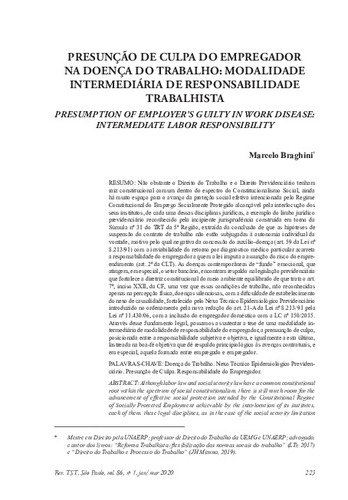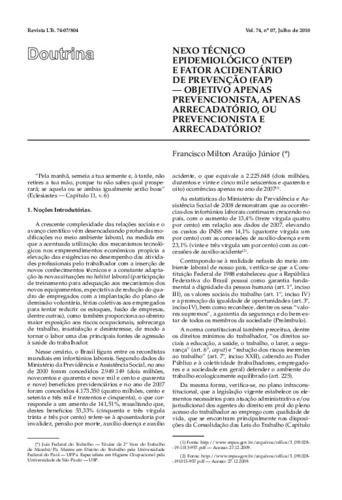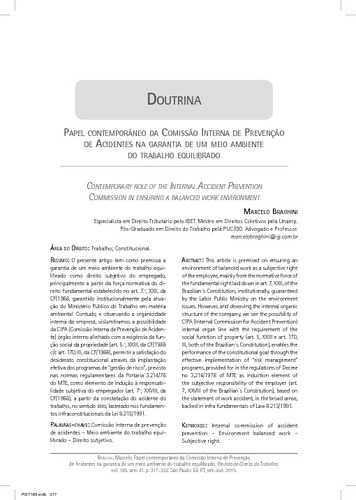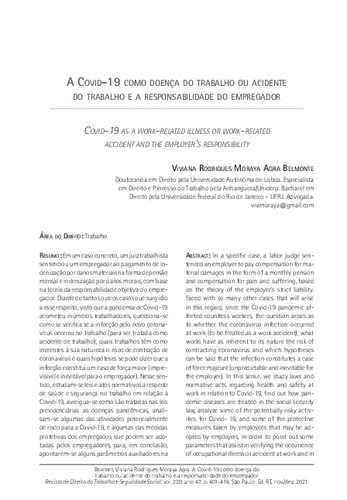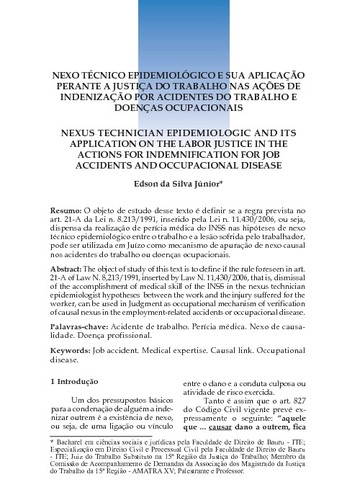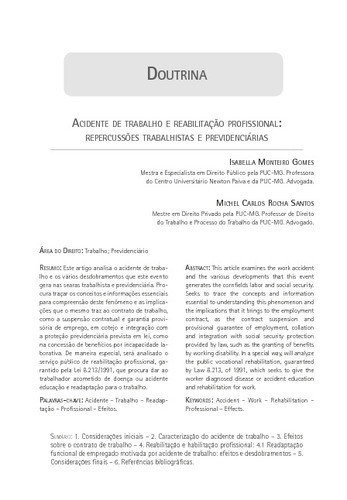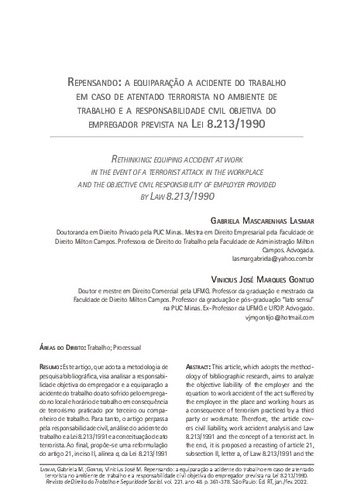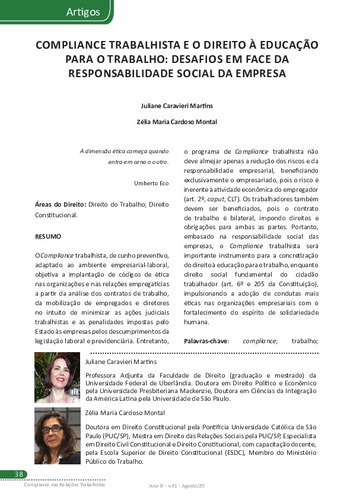Artigo de periódico
Presunção de culpa do empregador na doença do trabalho: modalidade intermediária de responsabilidade trabalhista
| dc.contributor.author | Braghini, Marcelo | |
| dc.date.accessioned | 2020-08-06T16:12:21Z | |
| dc.date.available | 2020-08-06T16:12:21Z | |
| dc.date.issued | 2020-03 | |
| dc.identifier.citation | BRAGHINI, Marcelo. Presunção de culpa do empregador na doença do trabalho: modalidade intermediária de responsabilidade trabalhista = Presumption of employer’s guilty in work disease: intermediate labor responsibility. Revista do Tribunal Superior do Trabalho, São Paulo, v. 86, n. 1, p. 223-249, jan./mar. 2020. | pt_BR |
| dc.identifier.uri | https://hdl.handle.net/20.500.12178/175711 | |
| dc.description.abstract | [por] Não obstante o Direito do Trabalho e o Direito Previdenciário tenham raiz constitucional comum dentro do espectro do Constitucionalismo Social, ainda há muito espaço para o avanço da proteção social efetiva intencionada pelo Regime Constitucional do Emprego Socialmente Protegido alcançável pela interlocução dos seus institutos, de cada uma dessas disciplinas jurídicas, a exemplo do limbo jurídico previdenciário reconhecido pela incipiente jurisprudência construída em torno da Súmula n. 31 do TRT da 5ª Região, extraída da conclusão de que as hipóteses de suspensão do contrato de trabalho não estão subjugadas à autonomia individual da vontade, motivo pelo qual negativa da concessão do auxílio-doença (art. 59 da Lei n. 8.213/91) com a inviabilidade do retorno por diagnóstico médico particular acarreta a responsabilidade do empregador a quem a lei imputa a assunção do risco do empreendimento (art. 2º da CLT). As doenças contemporâneas de "fundo" emocional, que atingem, em especial, o setor bancário, encontram respaldo na legislação previdenciária que fortalece a diretriz constitucional do meio ambiente equilibrado de que trata o art. 7º, XXII, da CF, uma vez que essas condições de trabalho, não reconhecidas apenas na percepção física, doenças silenciosas, com a dificuldade de estabelecimento do nexo de causalidade, fortalecido pelo Nexo Técnico Epidemiológico Previdenciário introduzido no ordenamento pela nova redação do art. 21-A da Lei n. 8.213/91 pela Lei n. 11.430/06, com a inclusão do empregador doméstico com a LC n. 150/2015. Através desse fundamento legal, passamos a sustentar a tese de uma modalidade intermediária de modalidade de responsabilidade do empregador, a presunção de culpa, posicionada entre a responsabilidade subjetiva e objetiva, e igualmente a esta última, lastreada na boa-fé objetiva que dê respaldo principiológico às avenças contratuais, e em especial, aquela formada entre empregado e empregador. | pt_BR |
| dc.description.abstract | [eng] Although labor law and social security law have a common constitutional root within the spectrum of social constitutionalism, there is still much room for the advancement of effective social protection intended by the Constitutional Regime of Socially Protected Employment achievable by the interlocution of its institutes, each of them. these legal disciplines, as in the case of the social security limitation recognized by the incipient jurisprudence built around the 5th TRT Precedent no. 31, taken from the conclusion that the hypotheses of suspension of the employment contract are not subject to individual autonomy of will, reason whereby the negation of the granting of the sick pay (art. 5º of Law no. 8.213/91) with the unfeasibility of the return by private medical diagnosis entails the responsibility of the employer to whom the law imputes the assumption of the risk of the enterprise (art. 2º CLT). The contemporary diseases of emotional "background", which affect in particular the banking sector, are supported by social security legislation that strengthens the constitutional directive of the balanced environment dealt with in art. 7º, item XXII, of the CF, since these working conditions, not only recognized in physical perception, silent diseases, with the difficulty of establishing the causal link, strengthened by the Social Security Epidemiological Technical Nexus introduced in the organization by the new wording of art. 21-A of Law no. 8,213/91 by Law no. 11,430/06, with the inclusion of the domestic employer with LC no. 150/15. Through this legal foundation we come to support the thesis of an intermediate modality of employer responsibility modality, the presumption of guilt, positioned between subjective and objective responsibility, and also to the latter, based on objective good faith that gives principled support to covenants and especially that formed between employee and employer. | pt_BR |
| dc.description.tableofcontents | Responsabilidade do empregador -- Teoria do abuso do direito -- Responsabilidade civil por acidente do trabalho -- Nexo técnico epidemiológico previdenciário | pt_BR |
| dc.language.iso | pt_BR | pt_BR |
| dc.relation.ispartof | Revista do Tribunal Superior do Trabalho: vol. 86, n. 1 (jan./mar. 2020) | pt_BR |
| dc.subject | Doença profissional, Brasil | pt_BR |
| dc.subject | Acidente do trabalho, Brasil | pt_BR |
| dc.subject | Responsabilidade do empregador, Brasil | pt_BR |
| dc.subject | Empregador, responsabilidade civil, Brasil | pt_BR |
| dc.subject | Nexo de causalidade, Brasil | pt_BR |
| dc.subject | Culpa | pt_BR |
| dc.subject | Responsabilidade objetiva, Brasil | pt_BR |
| dc.title | Presunção de culpa do empregador na doença do trabalho: modalidade intermediária de responsabilidade trabalhista | pt_BR |
| dc.title.alternative | Presumption of employer’s guilty in work disease: intermediate labor responsibility | pt_BR |
| dc.type.genre | Artigo de periódico | pt_BR |
| dc.identifier.rvbisys | 001174206 | |
| dc.relation.ispartoflink | https://hdl.handle.net/20.500.12178/175590 | pt_BR |
Coleção
-
Artigos9566


